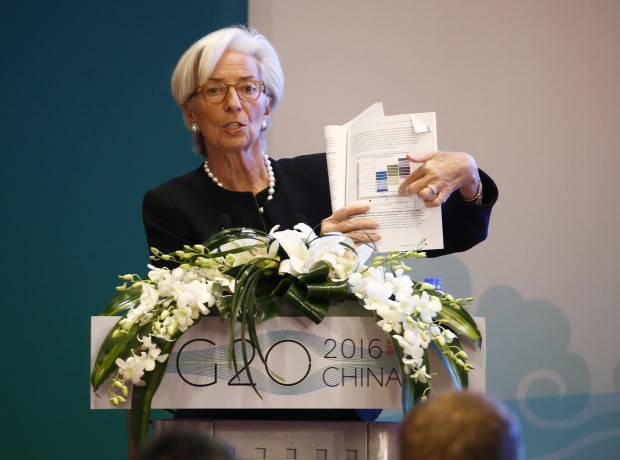IMF’s Lagarde, other G20 finance VIPs urge action on reforms

International Monetary Fund managing director Christine Lagarde holds a document report while speaking during a session of the G20 High-Level Seminar on Structural Reform, proceeding the G20 Finance Ministers and Central Bank Governors Meeting at Pudong Shangri-la Hotel in Shanghai, China, on Feb. 26. AP
SHANGHAI—Officials at a global finance meeting Friday in Shanghai urged governments to speed up promised job-creating reforms instead of relying on stimulus to perk up slackening growth.
Governments have tried to squelch expectations the Group of 20 gathering of finance ministers and central bankers from the United States, China, Japan, Germany and other major rich and emerging economies will produce specific growth plans. But they face pressure to reassure nervous financial markets.
Christine Lagarde, the managing director of the International Monetary Fund, said governments should act faster on reforms promised at a G-20 meeting in 2014. That list included some 800 commitments meant to simplify regulations and boost trade, investment and technology development, but many have yet to be carried out.
“Policymakers do not need to invent yet another trick, but they need to deliver steadily on the commitments they have made,” Lagarde said at an event organized by the Washington-based Institute of International Finance alongside the Shanghai meeting.
Referring to monetary and fiscal policy and structural reforms, Lagarde said, “There has to be action on all fronts.”
Others at the meeting include US Treasury Secretary Jacob Lew and Federal Reserve chair Janet Yellen; China’s finance minister, Lou Jiwei, and central bank governor, Zhou Xiaochuan; Mario Draghi of the European Central Bank and their counterparts from Europe, South Korea, India and South Africa.
Global growth is at its lowest in two years and forecasters say the danger of recession is rising. The IMF cut this year’s global growth forecast by 0.2 percentage points last month to 3.4 percent. It said another downgrade is likely in April.
Central banks still have room to use interest rate cuts and other stimulus but need governments to follow through with promised economic changes, said Mark Carney, head of the Bank of England.
“Global growth has disappointed because the innovation and ambition of global monetary policy has not been matched by structural measures,” said Carney at the IIF event. “In most advanced economies, difficult structural reforms have been deferred.”
Germany’s finance minister, Wolfgang Schauble, said fiscal stimulus has “reached its limit” and his government will not agree to more coordinated spending in the event of further deterioration in the global economy. He urged other countries to deliver on reforms instead.
“We are not lacking in policy proposals,” he said. “We are lacking in policy implementation.”
Also Friday, China’s central bank chief promised to avoid weakening its yuan to boost sagging exports as he tried to reassure nervous financial markets about his government’s handling of its economy and currency.
The Chinese hosts hoped to use the meeting to promote their campaign for a bigger voice in managing global trade and finance. Instead, the communist government is scrambling to defend its reputation for economic competence following stock market and currency turmoil.
A key worry, despite repeated Chinese denials, is that Beijing will allow its yuan to decline to support struggling exporters. That expectation has driven an outflow of capital from China that spiked to a record $135 billion in December.
“We will not resort to competitive depreciation to boost our advantage in exports,” said Zhou Xiaochuan, governor of the People’s Bank of China, at a news conference.
Zhou said the meeting should focus on global demand, economic reforms and promoting “sustainable and balanced” growth.
The foreign view of China’s economic health was shaken last year by a stock market collapse that wiped out $5 trillion in paper wealth. Its main market index fell by an unusually large daily margin of 6.4 percent on Thursday but gained almost 1 percent on Friday.
At the G-20 opening ceremony, Zhou tried to reassure his audience the Chinese economy is robust after growth slowed to a 25-year low of 7.3 percent last year. He noted that it still was among the world’s strongest performances.
“China’s economic fundamentals remain strong and supportive of growth,” he said. “The Chinese economy will continue to grow at a moderate-to-high pace.”